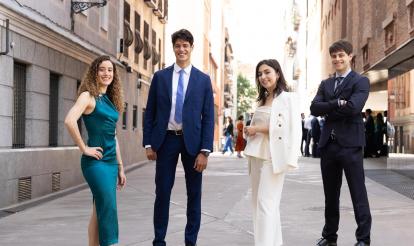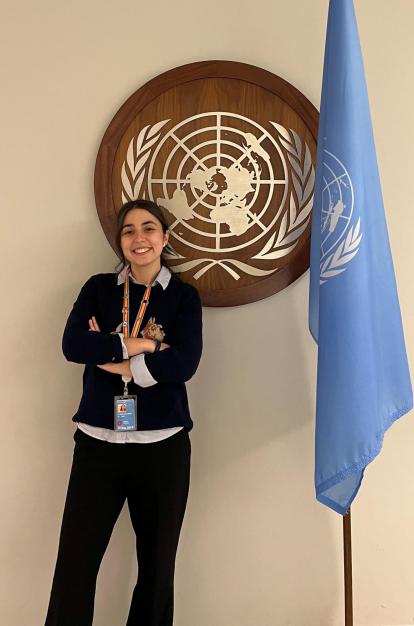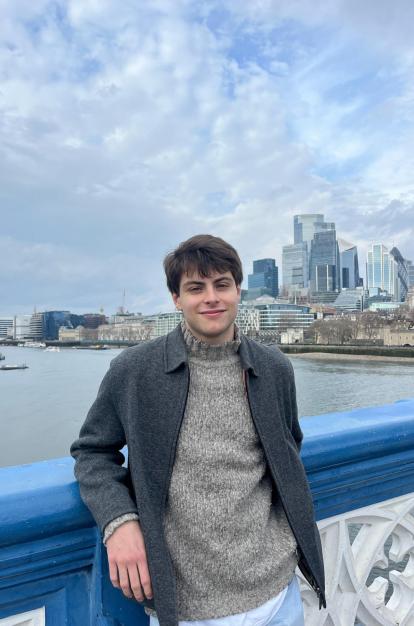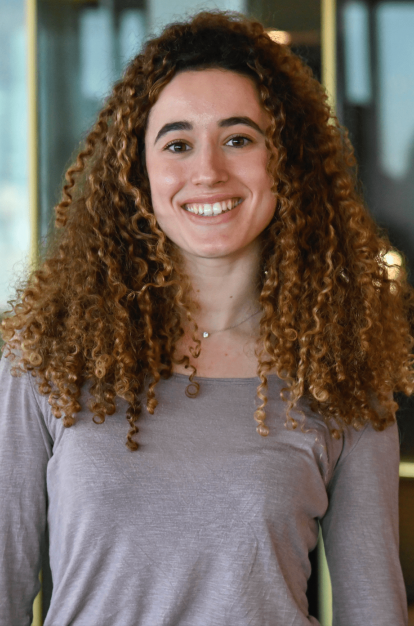
You are reading:

You are reading:

12.08.25
9 minutes readSend your questions to:
Master’s degree in Artificial Intelligence for Biomedicine and Healthcare at University College London (United Kingdom)
Request interviewPhD in Astronomy from the University of Cambridge (United Kingdom)
Request interviewMaster’s degree in Applied Ethics and Public Policy at Duke University (United States)
Request interviewMáster MVA en la École Normale Supérieure Paris-Saclay (Francia)
Request interviewAlbert Gimó, Belén Luengo, Gonzalo Plaza and Júlia Laguna are four of the 100 students who have received a fellowship from the ”la Caixa” Foundation to study for a postgraduate degree abroad. Despite coming from disciplines as diverse as biomedicine, mathematics, astronomy and applied ethics, they share a common goal: to develop artificial intelligence created by and for humans, focused on the common good.
Describing the rise of artificial intelligence (AI) as meteoric is no exaggeration. In just a few years and at a speed that is difficult to comprehend, this technology has gone from the fringes of academia to the heart of our daily lives, dominating headlines, arousing passions and stirring controversy. Just as it has fuelled the collective imagination, it has also unleashed some of our deepest fears.
What began as the promise of a new era – more efficient, more interconnected, wiser – has, in the public imagination, morphed into the harbinger of collapse. Yet amid the noise, the neurosis and the wonder, other voices are emerging. Young, brilliant, committed voices. Minds that see AI not as an end in itself, but as a tool with as yet immeasurable potential, depending on the purpose that drives its development.
“I’ve always liked maths,” says Albert Gimó (born 2001), who discovered his passion for logic puzzles and algebra problems during childhood. The hobby he used to share with his father in the afternoons would eventually shape the course of his studies.
Today, thanks to the postgraduate fellowship to study abroad from the ”la Caixa” Foundation, he is studying for a master’s degree in Mathematics, Vision and Learning at Université Paris-Saclay (France), with a strong interest in aligning AI systems with human values. The aim of his research is to prevent or mitigate the adverse effects that arise from training these algorithms on biased data.

A large part of his work focuses on large language models, such as ChatGPT. Their training, he explains, is divided into two phases: the first, unsupervised, in which the model learns linguistic patterns from massive volumes of data; and the second, where efforts are made to align its responses with human values and preferences. It is at this stage that one of the major challenges arises: “It’s difficult to assign numbers or create rankings to convey to the model what is intuitive for us. We have a certain sense of when a response is useful, but it’s hard to translate that into a metric.”
Rather than relying on the good intentions of those who design these systems, Albert advocates a conscious and proactive approach to technological development: “It’s not enough to have no ill intent; you have to actively consider the consequences.” Only then, he believes, can we maximise its positive impact.
With an approach that straddles the technical and the human, Albert warns of the dangers of conducting research without considering who will be affected by these developments. “It’s easy to get caught up in the [vicious] cycle of publishing papers, discovering new methods, attending conferences… and forget the impact our work has on people.” That is why he advocates for AI in which technical decisions are also informed by philosophical or psychological knowledge. Without that holistic perspective, he says, the risk of becoming disconnected from the real world is “far too high”.

Belén Luengo (2001) was not drawn to technology solely by intellectual curiosity, her fascination stemmed from lived experience.“My brother has a severe disability, and when I was a child I dreamed of becoming a doctor so I could cure him,” she recalls. Time and her studies – Law and International Studies at the Carlos III University in Madrid – took her down other paths, but she never let go of that early scientific curiosity: “My hero was Eduard Punset”.
Today, thanks to the ”la Caixa” Foundation fellowship, she is eagerly preparing to pursue a master’s degree in Applied Ethics and Public Policy at Duke University (USA), with a focus on developing technologies that promote equity and empower traditionally marginalised communities and people with disabilities.
She collaborates with The NeuroRights Foundation, where she works to defend mental rights in response to the rise of neurotechnologies. “One of the common uses of AI in this field is its application in brain-computer interfaces to help restore communication abilities, for example, in people with ALS. It’s something that can be life-changing, as it helps alleviate locked-in syndrome,” she explains.
She firmly believes that technology is not neutral; on the contrary, it reflects human priorities. “Unfortunately, there are people in the world with both good and bad intentions, and AI acts as a catalyst for both.” Such frenetic progress, she notes, “forces us to constantly rethink what kind of society we want to build and where we want to go.” The key, she argues with optimism, is to bring philosophy back to the centre, before speed ends up making the decisions for us.

From the beginning of his studies in Biomedical Engineering, Gonzalo Plaza (born 2002) knew that his professional path would be linked to healthcare. AI emerged as a tool that, beyond being a digital revolution, opened up endless clinical possibilities. Thanks to the ”la Caixa” Foundation fellowship for postgraduate studies abroad, he is now studying for a master’s degree in Artificial Intelligence Applied to Biomedicine and Healthcare at University College London (UK), and is collaborating with the paediatric centre Great Ormond Street Hospital on projects that integrate AI models into sensitive clinical settings.
Neuroengineering, where AI can detect patterns in brain signals that are invisible to the human eye, is one of his main interests: “I was instantly fascinated. How is it possible that our thoughts can emerge from matter?” What excites him most is its potential to humanise medicine by automating repetitive tasks, giving doctors back their time and presence. “How many times have we gone to an appointment and had just one minute to explain what’s wrong while the doctor types away at the computer? Their job isn’t to fill out forms, it’s to listen to the patient,” he insists. “Let’s make their lives easier.”
For Gonzalo, AI should be a tool to support clinical work, not a replacement for human judgement. That is why he insists that healthcare professionals must understand how the models work and what their outputs really mean. “It’s not an entity that can be held ethically or legally responsible. It doesn’t reason in the way we understand reasoning,” he explains. He is concerned not only about misuse but also about wasted potential: hospitals without interoperable systems, disorganised data and medical information left unused. “High-quality AI can only be built with high-quality data. And that data is out there. We just need to know how to organise it.”

From a young age, Júlia Laguna (born 2000) felt drawn to the universe, quite literally. The cosmology documentaries she watched with her parents sparked an early fascination that took shape in her double degree in Physics and Mathematics, and which now leads her to pursue a PhD in Astronomy at the University of Cambridge, supported by the ”la Caixa” Foundation fellowship. Her field of research, far from the romantic image of a telescope, is filled with code, algorithms and colossal volumes of data.
She works with quasi-stellar objects – intensely bright sources of light at the centres of distant galaxies – to better understand the evolution of the cosmos. In this context, AI is not a complement, but a necessity. “The new generation of telescopes will produce astronomical amounts of data. The only way to make use of it is with AI,” she says. What was once analysed on a human scale can now only be tackled with automated models capable of detecting complex patterns in real time.
However, Júlia remains critical of the excessive enthusiasm surrounding the sector. She advocates for simpler, more interpretable and more reliable models: “It’s easy to get swept up in the latest trends,” she warns, “but we need to prioritise those we understand better, so we can explain the results.” Although she believes in the benefits these technologies can unlock, she does not lose sight of the risks. “Like any revolution, AI comes with drawbacks. As long as it’s used sensibly, things will go well. The problem is that we might not see its negative effects for another ten years, and by then it could be too late.”
More than implementing cutting-edge techniques, the real challenge in minimising any potential consequences is to communicate their usefulness to the wider public with honesty. “Building trust is key,” she emphasises. Because although her research reaches for the skies, her conviction is very down to earth: knowledge, when shared, can also improve life down here.
Beyond the financial support, receiving a fellowship from the ”la Caixa” Foundation has been a turning point in the lives of these four young people. “It’s a vote of confidence,” says Albert, while Júlia admits it was “the final piece I needed to be able to start my PhD.” For Belén and Gonzalo, the most exciting aspect is “the network of fascinating people” they are building, a diverse community that grows year after year and, like them, believes in AI designed to advance and to care.
In the 2024 edition of the ”la Caixa” Foundation’s postgraduate fellowships abroad, 1,045 eligible applications were received for one of the 100 fellowships available. These were awarded through a rigorous selection process involving expert evaluation and personal interviews. Since the programme began in 1982 and up to the 2024 call, the ”la Caixa” Foundation has invested a total of over 219 million euros in supporting the overseas studies of 3,977 students.